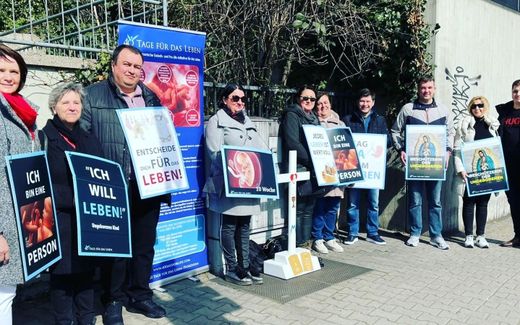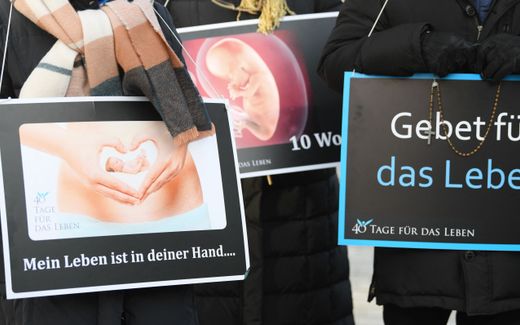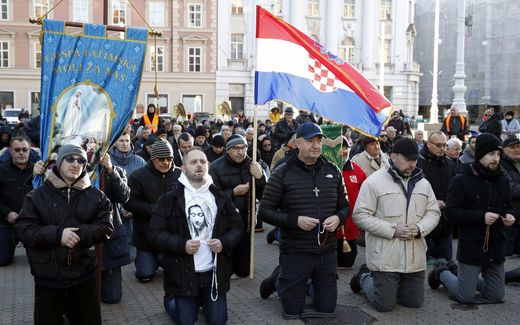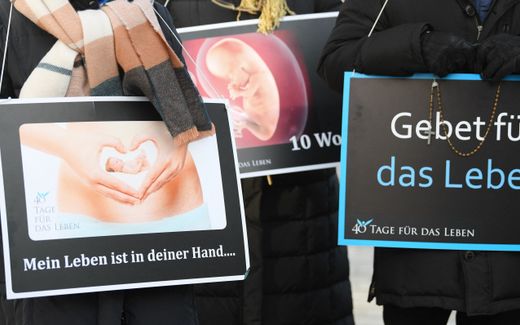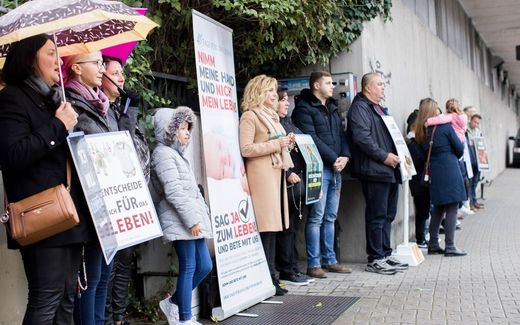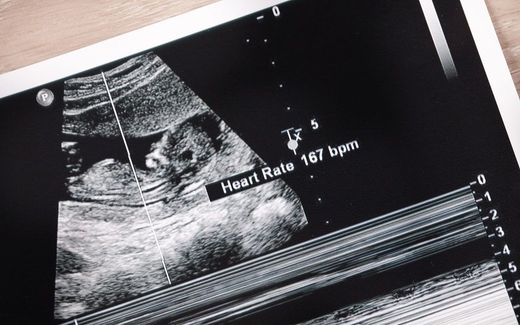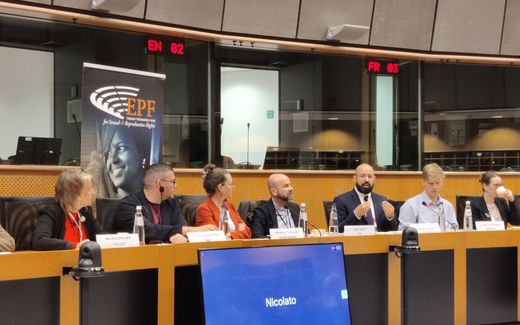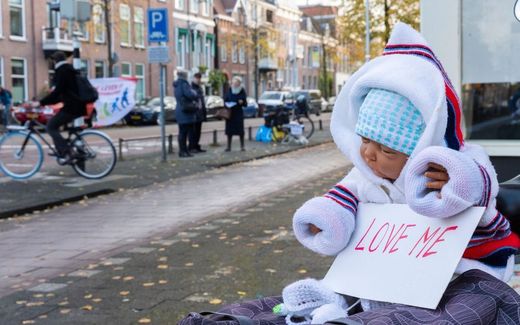How the struggle around abortion centres hardens
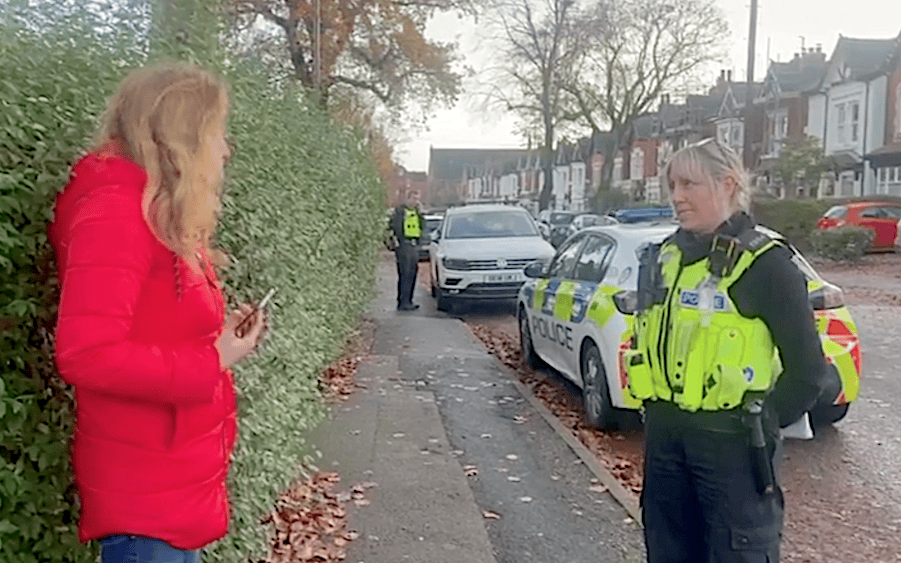
Isabel Vaughan-Spruce (left) approached by an English police agent because of silent prayer in the neighbourhood of an abortion clinic. Still from video at X.com
European Union
All around Europe, governments are taking measures to protect the practice of abortion. The rights of activists, even their freedom of speech, are increasingly curtailed. Some countries even try to limit prayer. “It would take a miracle to change the course developments are taking.”
For many people in the modern world, abortion (abortus provocatus) is an inalienable human right, vindicating women’s right to self-determination. For others, however, abortion is evil, a crime, making an end to the beginning of a new human life.
Though abortion has become a practice protected by law in many countries, people indignant about the practice continue to protest it – politically, by parliamentarian means, and also through activism, by demonstrating with dignity against it. But in more and more European countries, protests against abortion have become increasingly restricted.
England
In England, for example, activists campaigning against abortion by praying silently in the immediate surroundings of an abortion clinic have been arrested. A new law, introduced in the spring of this year, clears public spaces of volunteers offering help and silently praying for women in crisis pregnancies near abortion facilities. These areas are called PSPOs (Public Space Protection Orders).
A clear example of what is going on is the interrogations by the London police of Isabel Vaughan-Spruce, co-director of March for Life UK, who has been arrested several times and was acquitted just as often.

When she prays silently in the direct neighbourhood of some abortion centre, a police officer will show up and read to her a series of questions from some formulary. As she finds herself in what is called an exclusion zone (‘safe area’), the officer asks her to act elsewhere.
Isabel responds that she is not carrying out any actions: “I’m just simply thinking, silently in my head […] I am praying for those who’ve been hurt by abortion”. Finally, the officer will tell her he will issue a fixed penalty notice “because I believe, and my colleague believes, that you’re here to protest. Isabel: “I’ve just told you I’m not protesting. I’m simply silently praying”.
Ludicrous
Ryan Christopher, deputy director at ADF International, explains that in the past, local councils could make local laws to assign exclusion zones around abortion clinics. “‘Many of them used this power to criminalise any prof- life activity.”’
Recently, Labour MPs amended these local laws to make them national laws. And this law now in practice also includes the activity of silent prayer.”
Though Isabel Vaughan-Spruce has been arrested and charged three times now, the British Crime Prosecution Service so far has refused to persecute her. They called it ‘ludicrous’ and ‘ridiculous’ to arrest her as a criminal.
Despite that, Christopher is not optimistic about the near future. He expects that the new Labour government will fully decriminalise abortion and even fears that pro-life information on the internet may be forbidden. “‘It would take a miracle to change the course developments are taking.”
Germany
In Germany, the minister of Family Affairs, Lisa Paus (Büdnis 90/Die Grünen), is proposing to change the existing law on abortion with an amendment to create exclusion zones of 100 metres around abortion clinics (Entwurf eines Gesetzes zur zweiten Änderung des Schwangerschaftskonfliktgesetzes).
This change is implemented to protect women who want an abortion or are looking for advice against what is called ‘Gehsteigbelästigung’: street intimidation. Any person within a hundred meters of a clinic, praying or demonstrating, will be fined 5,000 euros.
Lisa Paus is also developing legislation to completely decriminalise abortion by deleting Article 218 from the German Penal Law. So far, there is no majority in Parliament supporting her plans. Cornelia Kaminski, chair of the pro-life organisation Aktion Lebensrecht für Alle, believes that this situation makes it abundantly clear that the political elite of Germany is far alienated from the sentiments of the German population.
She also denies that pro-life activities in the neighbourhood of abortion clinics have been intimidating. “These activities are respectful and peaceful.” Moreover, she adds, the prohibition of prayer is against the law.
Netherlands
In the Netherlands, the situation around the abortion issue has hardened as well. Kees van Helden, director of the association Choose Life (Kies Leven), supports women who as vigilantes (‘waaksters’) are standing in the immediate neighbourhood of Dutch abortion centres, offering leaflets to women who are about to enter the clinic to have an abortion.
According to Van Helden, this method is very effective. After handing out the pamphlet, a conversation often follows, and a woman regularly decides to cancel her appointment at the clinic. This proves that the preliminary stage of the accompaniment of pregnant women is unsatisfactory. It also proves that breaking through the use of concealing descriptions for a human foetus (words like ‘tissue’ or ‘clump of cells’) already makes a difference.
In the pamphlet, women who are about to have an abortion are called upon to ‘protect their baby’, pictures of pregnant women and ultrasounds are shown, and assistance is offered to them.
One-person-protests

This method, however, meets with more and more resistance. Several vigilantes have been arrested lately. The legal basis for these arrests is believed to be supplied by the Dutch law on public manifestations. This law allows the possibility of assigning only certain areas for a demonstration.
In practice, this means that the vigilantes will have to stand 100 meters from the clinic, making it easy to avoid them and neglect the pamphlet and the invitation for a discussion. However, the essential point is that a public manifestation or demonstration is defined as an action by two or more people, while vigilantes always act on their own. The freedom of speech protects these one-person-protests.
In reality, however, the authorities treat these one-person protests as public manifestations and measure them with double standards. One of the vigilantes emailed the police, asking for information about a pro-Palestinian protest she was about to deliver.
The police answered that the freedom of speech protected this protest by one person and that she should feel free to publicly give her opinion on the Palestinian issue. When she felt unsafe, she was welcome to call the police. They would show up to protect her.
In complete defiance of this principle, however, in the case of abortion protests by one person, a single complaint about ‘irregularities’ by one of the employees of the clinic is enough to have the vigilante arrested and fined her.
Italy
More examples could be given. New laws in Northern Ireland against pro-life activism have even been interpreted by the Attorney General as a breach of human rights.
In Poland, the new government led by Donald Tusk is trying to bend the conservative laws introduced in 2021.
Other countries, like France, want to include abortion as a human right in their Constitutions.
The only exception is Italy, where the new prime minister, Giorgia Meloni, to the disgrace of members of the European Parliament, passed measures to allow pro-life activists to enter abortion consultation clinics. Whereas resistance to abortion is becoming more and more difficult in many European countries, in Italy, it is the access to abortion that is made more difficult.
Related Articles


